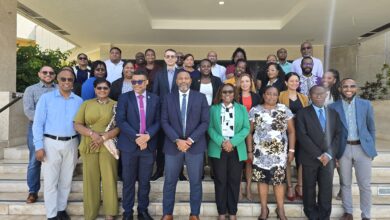(Presented by Dr. Edward Greene, Assistant Secretary-General,
Human and Social Development, CARICOM Secretariat)
It is my pleasure to be here at this Ninth Meeting of COHSOD, which focuses on labour issues in the context of human resource development in the Caribbean. However, let me first of all extend the apologies of the Hon Walter Sandriman, Minister of Education and Community Development of the Government of the Republic of Suriname who is the outgoing Chair of COHSOD, and who is unable to be here today because of other official commitments. He has asked me to extend very best wishes to his fellow Ministers, the Secretary-General and Staff of the CARICOM Secretariat and other colleagues and friends from around the Region.
My remarks to you were actually composed by the Hon Walter Sandriman. They are literally his reflections on the year during which he had the pleasure of chairing the COHSOD. It was a good experience, a learning experience, one in which, according to him, he actually became a Caribbean Man.
Suriname acceded to the Chair of COHSOD VII in October 2002, succeeding St. Vincent and the Grenadines. The year has indeed been a very hectic one for the COHSOD. COHSOD VII focused on the elements of a human and social development strategy for the Region, of which Labour, the focus of discussion at this meeting, was conceived as one of the core elements. It was clear from the nature of the discussions at that meeting that “investing in human resources with equity” was a most appropriate slogan on which to hang the policy discussions of the Region’s primary Council for the social sectors. Suriname had the pleasure of hosting COHSOD VIII in April 2003, which featured Culture and Youth. These discussions enabled us to place in context the economic importance of our cultural products and the need to invest in Youth, the future of our human resources capability, productivity and competitiveness. Indeed, in between the two main COHSODs we held a special COHSOD of Ministers of Education in Trinidad and Tobago in April, at which accreditation and standardisation issues, together with technical and vocational education, were the centre-pieces of our discussions. In addition, Suriname had the honour of hosting CARIFESTA VII which, for those who attended, was an experience that truly demonstrated the viability of our cultural and performing arts and showed how culture is a cementing element in our regional endeavours. As far as Suriname is concerned, the high visibility of CARICOM, including the presence of the Ministers, Government Officials, the private sector, NGOs, and the Secretary-General, Deputy Secretary-General and Assistant Secretaries-General and Staff, meant that we had arrived as an integral part of the CARICOM family.
What have we achieved as a group in this year? First of all, the COHSOD has consolidated its programme of work by establishing as its kernel, the integrating theme to which I have already referred, Investing in Human Resources with Equity. Such a theme has helped the Council to examine a variety of different issues – education, health, labour, gender, youth, culture, sport and crime and drugs – under an umbrella that forces us to come up with intersectoral policies. In this regard, I challenge this Council to support the work of the Futures Policy Group. Its programme, if properly executed, may yet help us to determine how best we can package our human resources to ensure that the Region is more competitive in the global arena.
Secondly, COHSOD has placed much emphasis over the period on youth and development. In this regard, I was very happy that the Youth Ambassadors Programme was actually launched in Suriname when His Excellency Runaldo Venetiaan conferred the designation on 28 youth during the Special Meeting of Youth in September 2002. Indeed, Suriname also had the honour of having the first Dean of the CARICOM Youth Ambassadors Corps. We expect that this initiative will blossom and help the Community to expand its reach and to ensure that the national youth movements become sources of the ideal Caribbean citizen to which our Charter of Civil Society refers. We need to convert the symbols into meaningful programmes that strike at the heart of our Community’s future. Hence, when COHSOD VIII in Surname examined the economic value of investing in youth, it may have seemed self-evident, but the discussion provided the essence of future policy directions for this Council and indeed for the Community as a whole.
Thirdly, the COHSOD is challenged to reorganise CARIFESTA. From the experience so far, not only of Suriname but others that hosted this Festival, it is clear that we have to radically transform the structure of this Festival. We anxiously await the report of the Task Force that will be established by this COHSOD to review the festival and make recommendations. But there are many proposals already discussed at our COHSOD VIII and before, at the Special Meeting of Ministers of Culture in The Bahamas in September 2001. These all point to the need to professionalise the management of the Festival. It requires a permanent CARIFESTA Secretariat. This, in turn, requires Funds. Member States need to deal with this issue now. The CARICOM Foundation for the Arts and Culture and indeed, CARICOM, cannot continue to postpone the appointment of a Cultural Officer.
We in Suriname would like to express our appreciation to Dr. Carole Maison-Bishop, who has spearheaded the operations of the Culture Desk over the past year and who provided yeoman assistance to Suriname’s CARIFESTA National Office. To her we owe a debt of gratitude and, from her level of comfort and adaptability to the Surinamese way of life, we know for sure that she is truly a CARICOM citizen. We also wish to acknowledge the assistance provided by Mr. Leonard Robertson of the Secretary-General’s Office, who worked with Dr. Bishop to help to make CARIFESTA VIII the success it was.
During this period, too, Suriname presided over the Caucus of Ministers of Health. Dr. Mohamed Khudabux, Minister of Health, was privileged to be in the chair of a meeting that dealt with a cross-section of issues which included policies for increasing the availability of antiretroviral drugs for people living with HIV/AIDS; the training of environmental health specialists; and the migration of professionals, in particular, nurses. We were also pleased to note the rapid strides of the Pan Caribbean Partnership against HIV/AIDS (PANCAP), coordinated by the Secretariat. Another important initiative was the launching of the Caribbean Commission on Health and Development under the Chairmanship of Sir George Alleyne. These two initiatives, no doubt, will help the Region as a whole to fulfill the mandate of the Nassau Declaration. COHSOD should feel a sense of pride in the pace of these developments.
Suriname is proud of the achievements of the COHSOD during this year, and is equally certain that these strides could not have been made without the support we received from the Secretariat and other regional and international agencies. In welcoming Minister Achong to the Chair, I am sure that he can count on the same measure of support, which I received during my tenure.
May our discussions be frank and fruitful, as we continue to strive for the equitable development of our Region’s Human Resources.
Thank you.





